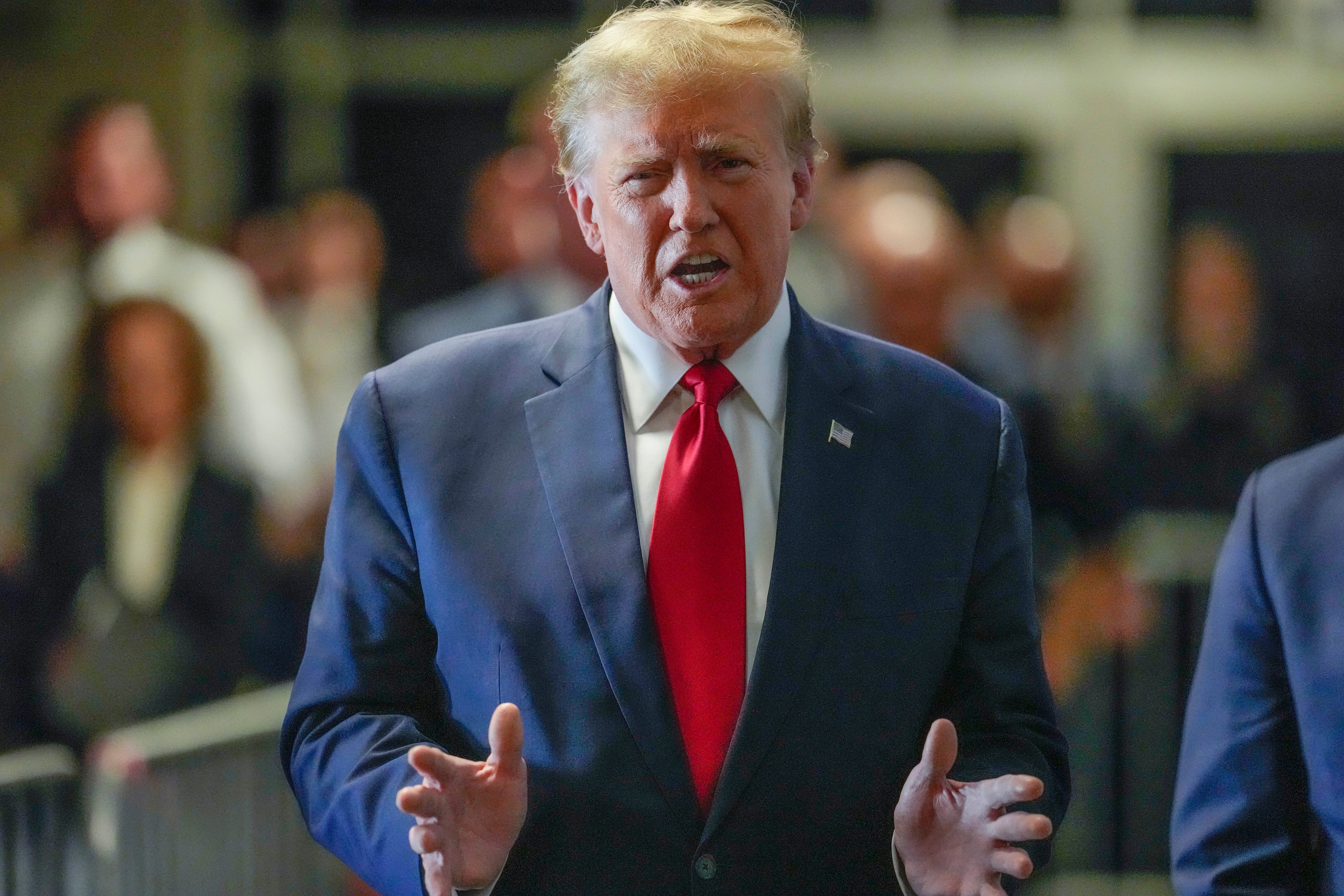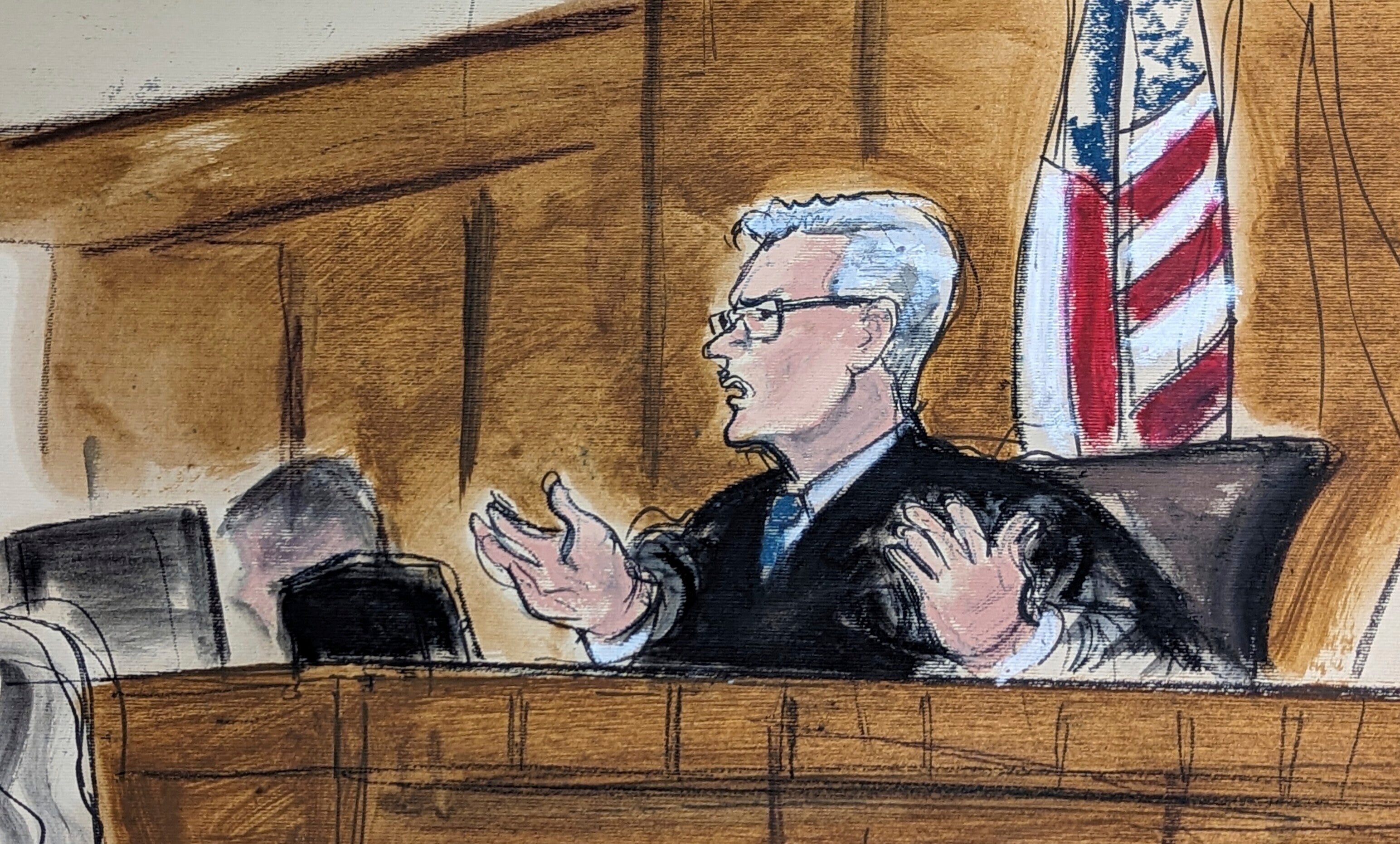Frustrated Trump judge sets hush money trial date as he throws out bid to dismiss case
Trump will face his first criminal trial among the four cases against him on 25 March
Donald Trump will face a criminal trial in New York next month on nearly three dozen charges of falsifying business records in connection with hush money payments made to an adult film star at the onset of his 2016 presidential campaign.
The former president will stand trial on 25 March, what will likely be the first trial among the four criminal cases against him, as well as the first criminal trial against any current or former president.
With Mr Trump in attendance, New York Judge Juan Merchan held a pretrial hearing on Thursday in which he confirmed that the trial would go ahead as planned on the previously scheduled court date and rejected the former president’s attorneys’ attempts to dismiss the case altogether.
Mr Trump entered the courtroom in New York County Supreme Court in lower Manhattan at 9.30am ET on Thursday and strode past a velvet rope to the wide wooden defence table in front of the judge. He briefly stood by himself at the table before his attorneys joined him.
Judge Merchan noted that he had recently spoken with the federal judge overseeing Mr Trump’s election interference case in Washington DC, to avoid overlapping trial schedules.
The federal trial was previously scheduled to begin on 4 March, but the case has effectively been placed on hold while Mr Trump appeals his “presidential immunity” defence to the US Supreme Court. The tentative trial date has dropped off the calendar entirely, for now.
Based on that, Judge Merchan determined that “at this point, I can tell you we will plan for jury selection on 25 March”.
The trial is expected to last five to six weeks, with 15 to 17 days for the prosecution’s arguments, running from 9.30am to 4.30pm ET daily, except Wednesdays.
Mr Trump’s attorney Todd Blanche, who appeared caught off guard by the judge’s adherence to the trial schedule, called the decision a “grave injustice”.
“President Trump has been indicted in three other cases,” said Mr Blanche, who also is the lead attorney in a federal case charging Mr Trump for mishandling classified documents at his Mar-a-Lago property.
He said the former president faces an “extremely compressed” schedule to prepare for his four criminal cases, all tentatively set to go to trial in 2024, at a time when he is seeking the Republican nomination for president to face President Joe Biden in November.
Mr Trump has been “put in a truly impossible position,” he added.

The judge grew increasingly frustrated by Mr Blanche’s pleas, repeatedly telling him that his claims aren’t any different from those he has made in numerous court documents over the last year.
“This is not the first time I’ve heard any of these claims,” he said. “This is not the first time I’ve resolved any of these claims … At this point, under these circumstances, we’re moving ahead to jury selection on 25 March.”
The judge also fired back at Mr Blanche at one point as he spoke over the judge. “Stop interrupting me,” he said.
“You’re not going to be on trial in two places at the same time,” he said.
While Mr Blanche labelled the trial schedule “election interference,” echoing claims by Mr Trump and his legal teams, New York prosecutor Matthew Colangelo noted that the former president’s attorneys had previously indicated that the March trial date would actually “minimise” disrupting his campaign schedule because there are only a handful of Republican primary contests during tthat time.
Mr Trump’s attempts to move the trial date join a “continued pattern to evade accountability,” according to Mr Colangelo.
Mr Blanche also claimed that the “media saturation” surrounding the former president, particularly in the wake of a devastating defamation verdict in a case brought by E Jean Carroll, would be too “prejudicial” to his client.
“What are you asking me to do?” Judge Merchan asked. “Are you thinking the ‘media saturation’ is down by then?”

At the hearing, prosecutors and defence attorneys also reviewed proposed questions for prospective jurors, including asking whether they are involved in the “QAnon movement, Proud Boys, Antifa, and any other anarchist groups” or whether they listen to far-right sources such as Alex Jones, Tucker Carlson and Ben Shapiro.
The prosecution also wants to ask potential jurors if they believe the 2020 election was stolen – a false claim that is central to Mr Trump’s 2024 campaign.
“It demonstrates an unwillingness to follow the facts,” according to prosecutor Shua Steinglass.
Mr Blanche falsely claimed that “over half the country believes the election was stolen” and that “80 per cent of the country” believes “there’s some level of extreme unfairness in the criminal justice system, and what’s happened to President Trump.”
Mr Blanche also argued that potential jurors should have to disclose their political leanings.
“We can’t ignore the elephant in the room,” he said. “President Trump was the Republican president of the US, and he is being prosecuted by a Democrat district attorney.”
Mr Trump had been seen leaving his Trump Tower in New York shortly after 8.30am that morning, waving to bystanders, some of whom yelled “traitor” at the former president before he entered his motorcade.
Last year, in the first criminal indictment against him, a grand jury under Manhattan District Attorney Alvin Bragg charged the former president with 34 counts of falsifying business records in connection with repayments to his then-lawyer Michael Cohen, who arranged a hush-money scheme to prevent the release of potentially damaging stories about Mr Trump and his affairs.
Mr Trump has pleaded not guilty to all charges.
Mr Trump, Cohen and David Pecker, the former owner of the National Enquirer, allegedly worked in concert to “identify, purchase, and bury negative information” about then-candidate Mr Trump to boost his electoral prospects,” according to prosecutors.
The case could rely on testimony from Cohen, who joined the Trump Organization in 2006, and who made the payment to Ms Daniels only days before the 2016 election, according to prosecutors. Following Mr Trump’s election victory, he reimbursed his then “fixer”, who is expected to say in the upcoming trial that Mr Trump authorised his business to falsely file the payment as legal expenses.
Former Trump Organization chief financial officer Allen Weisselberg – who was separately prosecuted and convicted on tax fraud charges in 2022 – had agreed that Cohen would be paid a total of $420,000 to reimburse him for the payment to Daniels,” according to court documents.
That total represented $60,000 year-end bonus, his $130,000 payment to Ms Daniels, a $50,000 payment to Cohen for campaign expenses, and an additional $180,000 “to ensure Cohen was fully reimbursed after taxes,” according to the filing. “It was agreed that the $420,000 would be paid in installments on invoices Cohen would periodically send to Defendant through the Trump Organisation for alleged legal services rendered.”

Mr Trump finalised the agreement in February 2017, according to prosecutors.
The criminal case is separate from a sprawling civil trial targeting allegations of fraud in Mr Trump’s business empire. After a three-year investigation and a lawsuit from New York Attorney General Letitia James, followed by 11 weeks of witness testimony, the judge overseeing that case is expected to deliver a final ruling on Friday.
Ms James has requested Judge Arthur Engoron to sanction Mr Trump and his co-defendants $370m and effectively block him from working in real estate in New York for the rest of his life, dealing a massive blow to his fortune and his narrative of business success that has fuelled his political career.
Mr Trump has relied on the growing stack of cases and court dates on his calendar to cast himself as a victim of political persecution, elevating a conspiracy theory that Democratic officials are working in concert to keep him away from the White House.
“How can you run for election if you’re sitting in a courthouse all day? I’m supposed to be in South Carolina right now,” he told reporters before the hearing on Thursday.
“This case could [have been] brought three years ago – there is no case ... We’re here for something that is not a crime,” he added. “Nobody’s ever seen anything like it ... election interference is being run by Joe Biden’s White House, his top person who was placed here in order to make sure everything goes right.”

